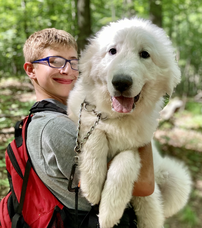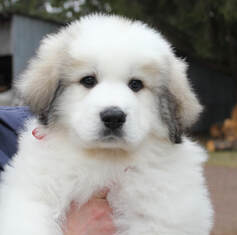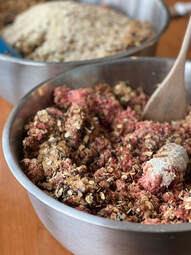Why We Do Not Participate in Guardian Homes
We love our dogs and want to be near and spend time with them - they are amazing!! And so, we would not want them to live anywhere but at our own home. The benefits of being with them (besides our personal enjoyment!) include being able to fully know each of our dogs personalities, temperaments, strengths and weaknesses. Therefore, we do not participate in/use Guardian home breeding programs - placing female dogs in other homes to raise and take care of, to then bring the females back for the duration of breeding, pregnancy, and whelping of puppies, to increase profit. The relationship of the breeder with their animals should be one that is close and constant. We can tell you in detail about each of our dogs on an individual basis - their pros, cons, funny quirks, and endearments. We know that our breeding pairs are dogs that our family trusts. Most of our puppies go to pet homes, with the other portion going to families that live on farms that want the close pet relationship with their dog, while they also protect their animals.
Careful Selection of Our Great Pyrenees
|
Great Pyrenees breed history is essential to knowledge of the breed, to factor in future breeding decisions to maintain the standard, as well as health and great genetics. Temperament, along with body conformation, health, strong pigment and correct coloring, and genetic markers are factors that we value and take into consideration. DNA swabs on each of our dogs, to ensure they are clear of all major and minor genetic health conditions; of both general types and those that are more common in the Great Pyrenees breed. OFA and Pennhip testing is complete or planned. Our focus is to continually look for ways to improve and maintain the Great Pyrenees breed standard in our lines using these tools, and strive to continue our learning.
|
Their Daily Care
|
For our dogs, we feed a daily base of dry lamb and rice or salmon and sweet potato kibble that is supplemented with raw and cooked meats, small amounts of raw jersey milk in season, and salmon oil. Our mamas get extra spoiled and are fed deluxe raw meatballs in addition during pregnancy, while nursing, and for replenishment. They are on a natural herbal deworming schedule, and receive traditional dewormer only as needed.
|
Why Purchase a Puppy From a Registered Great Pyrenees Pair?
This is a topic that many do not realize is important information to know and consider, especially with those who are new to the breed and/or to LGDs overall (livestock guardian dogs). LGD breeds, like all dogs, are bred for specific purposes and are alike in some ways within that large group, but separately can be still be significantly distinct from each other, and being aware of this can be crucial in picking the right dog for you. Without knowing the temperament of the parents and ensuring that the lines have not been crossed with other breeds, one can be a risk in bringing home a puppy with predisposed temperament markers that are not family-friendly. Choosing a puppy from a registered pair provides a consistency in temperament, but also in health - having a lineage of the family history of the dog also insures protection from inbreeding and provides information to follow the health of the line.


